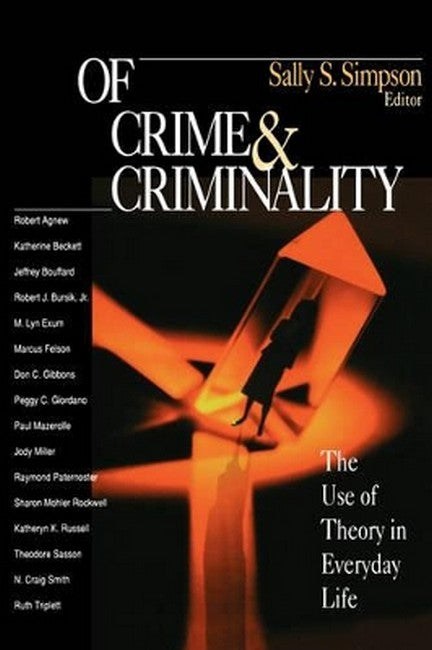Sally S. Simpson is Professor of Criminology and Criminal Justice at the University of Maryland, College Park. Her research interests include corporate crime, criminological theory, and the intersection between gender, race, class, and crime. Simpson is a Fellow of the American Society of Criminology and,in 2008, was named Distinguished Scholar by the Division on Women and Crime, American Society of Criminology. Simpson has served as President of the Association of Doctoral Programs in Criminology and Criminal Justice. She is former Chair of the Crime, Law, and Deviance Section of the American Sociological Association and past President of the White-Collar Crime Research Consortium. Recipient of the Herbert Bloch Award from the American Society of Criminology, in 2010 Simpson was named Woman of the Year by the President's Commission on Women's Issues at the Unviersity of Maryland.
Request Academic Copy
Please copy the ISBN for submitting review copy form
Description
Prelude - Sally S Simpson Introductory Chapter - Don C Gibbons Criminology, Criminologists, and Criminological Theory PART ONE: ACCOUNTING FOR GENDER, RACE AND CLASS DIFFERENCES IN CRIMINALITY AND CRIME CONTROL Differential Association Theory and Female Crime - Peggy C Giordana and Sharon Mohler Rockwell Feminist Theories of Women's Crime - Jody Miller Robbery as a Case Study Racial Hoaxes - Katheryn K Russell Applied Critical Race Theory The War on Crime as Hegemonic Strategy - Katherine Beckett and Theodore Sasson A Neo-Marxian Theory of New Punitiveness in U.S. Criminal Justice Policy PART TWO: TRADITIONAL CRIMINOLOGICAL THEORY UPDATED The Systematic Theory of Neighborhood Crime Rates - Robert J Bursik Jr Strain Theory and School Crime - Robert Agnew The Dramatization of Evil - Ruth Triplett Reacting to Juvenile Delinquency During the 1990's PART THREE: NEW DIRECTIONS IN THEORY - NEW IDEAS, APPLICATION, AND ISSUES The Social Control of Corporate Criminals - Sally S Simpson, M Lyn Exum, and N Craig Smith Shame and Informal Sanction Threats Whither the Beast? - Jeffrey Bouffard, M Lyn Exum, and Raymond Paternoster The Role of Emotions as a Rational Choice Theory of Crime Understanding Illicit Drug Use - Paul Maxerolle Lessons from Developmental Theory The Routine Activity Approach as a General Crime Theory - Marcus Felson

